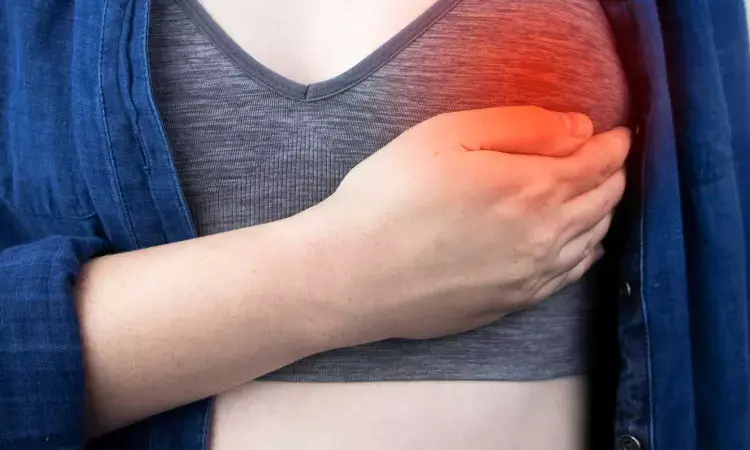- Home
- Medical news & Guidelines
- Anesthesiology
- Cardiology and CTVS
- Critical Care
- Dentistry
- Dermatology
- Diabetes and Endocrinology
- ENT
- Gastroenterology
- Medicine
- Nephrology
- Neurology
- Obstretics-Gynaecology
- Oncology
- Ophthalmology
- Orthopaedics
- Pediatrics-Neonatology
- Psychiatry
- Pulmonology
- Radiology
- Surgery
- Urology
- Laboratory Medicine
- Diet
- Nursing
- Paramedical
- Physiotherapy
- Health news
- Fact Check
- Bone Health Fact Check
- Brain Health Fact Check
- Cancer Related Fact Check
- Child Care Fact Check
- Dental and oral health fact check
- Diabetes and metabolic health fact check
- Diet and Nutrition Fact Check
- Eye and ENT Care Fact Check
- Fitness fact check
- Gut health fact check
- Heart health fact check
- Kidney health fact check
- Medical education fact check
- Men's health fact check
- Respiratory fact check
- Skin and hair care fact check
- Vaccine and Immunization fact check
- Women's health fact check
- AYUSH
- State News
- Andaman and Nicobar Islands
- Andhra Pradesh
- Arunachal Pradesh
- Assam
- Bihar
- Chandigarh
- Chattisgarh
- Dadra and Nagar Haveli
- Daman and Diu
- Delhi
- Goa
- Gujarat
- Haryana
- Himachal Pradesh
- Jammu & Kashmir
- Jharkhand
- Karnataka
- Kerala
- Ladakh
- Lakshadweep
- Madhya Pradesh
- Maharashtra
- Manipur
- Meghalaya
- Mizoram
- Nagaland
- Odisha
- Puducherry
- Punjab
- Rajasthan
- Sikkim
- Tamil Nadu
- Telangana
- Tripura
- Uttar Pradesh
- Uttrakhand
- West Bengal
- Medical Education
- Industry
Breast Reconstruction with autologous fat transfer improves QoL compared with reconstruction with implants

Breast Reconstruction with autologous fat transfer improves QoL compared with reconstruction with implants suggests a new study published in the
There is a need for a new, less invasive breast reconstruction option for patients who undergo mastectomy in their breast cancer treatment.
A study was done to investigate quality of life (QoL) among patients undergoing a new breast reconstruction technique, autologous fat transfer (AFT), compared with that among patients undergoing implant-based reconstruction (IBR).
The BREAST trial was a randomized clinical trial conducted between November 2, 2015, and October 31, 2021, performed in 7 hospitals across the Netherlands. Follow-up was 12 months. Referrals could be obtained from general practitioners and all departments from participating or nonparticipating hospitals. The patients with breast cancer who had undergone mastectomy and were seeking breast reconstruction were screened for eligibility (radiotherapy history and physique) by participating plastic surgeons. Patients receiving postmastectomy radiotherapy were excluded. Breast reconstruction with AFT plus expansion or 2-phased IBR. Randomization was done in a 1:1 ratio.
The statistical analysis was performed per protocol. The predefined primary outcome was QoL at 12 months after final surgery. This was measured by the BREAST-Q questionnaire, a validated breast reconstruction surgery questionnaire. Questions on the BREAST-Q questionnaire are scored from 0 to 100, with a higher score indicating greater satisfaction or better QoL (depending on the scale). Secondary outcomes were breast volume and the safety and efficacy of the techniques.
Results
A total of 193 female patients 18 years or older who desired breast reconstruction were included, of whom 91 patients in the AFT group and 80 in the IBR group received the allocated intervention. In total, 64 women in the AFT group and 68 women in the IBR group completed follow-up. In the IBR group, 18 patients dropped out mainly due to their aversion to implant use while in the AFT group 6 patients ended their treatment prematurely because of the burden (that is, the treatment being too heavy or tiring). The BREAST-Q scores were higher in the AFT group in all 5 domains and significantly higher in 3: satisfaction with breasts , physical well-being: chest, and satisfaction with outcome
Linear mixed-effects regression analysis showed that QoL change over time was dependent on the treatment group in favor of AFT. The mean (SD) breast volume achieved differed between the groups
No differences in oncological serious adverse events were found.
This randomized clinical trial found higher QoL and an increase in QoL scores over time in the AFT group compared with the IBR group. No evidence was found that AFT was unsafe. This is encouraging news since it provides a third, less invasive reconstruction option for patients with breast cancer.
Reference:
Piatkowski AA, Wederfoort JLM, Hommes JE, et al. Effect of Total Breast Reconstruction With Autologous Fat Transfer Using an Expansion Device vs Implants on Quality of Life Among Patients With Breast Cancer: A Randomized Clinical Trial. JAMA Surg. 2023;158(5):456–464. doi:10.1001/jamasurg.2022.7625
Keywords:
Breast Reconstruction, autologous, fat transfer, improves, QoL, compared, reconstruction, implants
Dr. Shravani Dali has completed her BDS from Pravara institute of medical sciences, loni. Following which she extensively worked in the healthcare sector for 2+ years. She has been actively involved in writing blogs in field of health and wellness. Currently she is pursuing her Masters of public health-health administration from Tata institute of social sciences. She can be contacted at editorial@medicaldialogues.in.
Dr Kamal Kant Kohli-MBBS, DTCD- a chest specialist with more than 30 years of practice and a flair for writing clinical articles, Dr Kamal Kant Kohli joined Medical Dialogues as a Chief Editor of Medical News. Besides writing articles, as an editor, he proofreads and verifies all the medical content published on Medical Dialogues including those coming from journals, studies,medical conferences,guidelines etc. Email: drkohli@medicaldialogues.in. Contact no. 011-43720751


